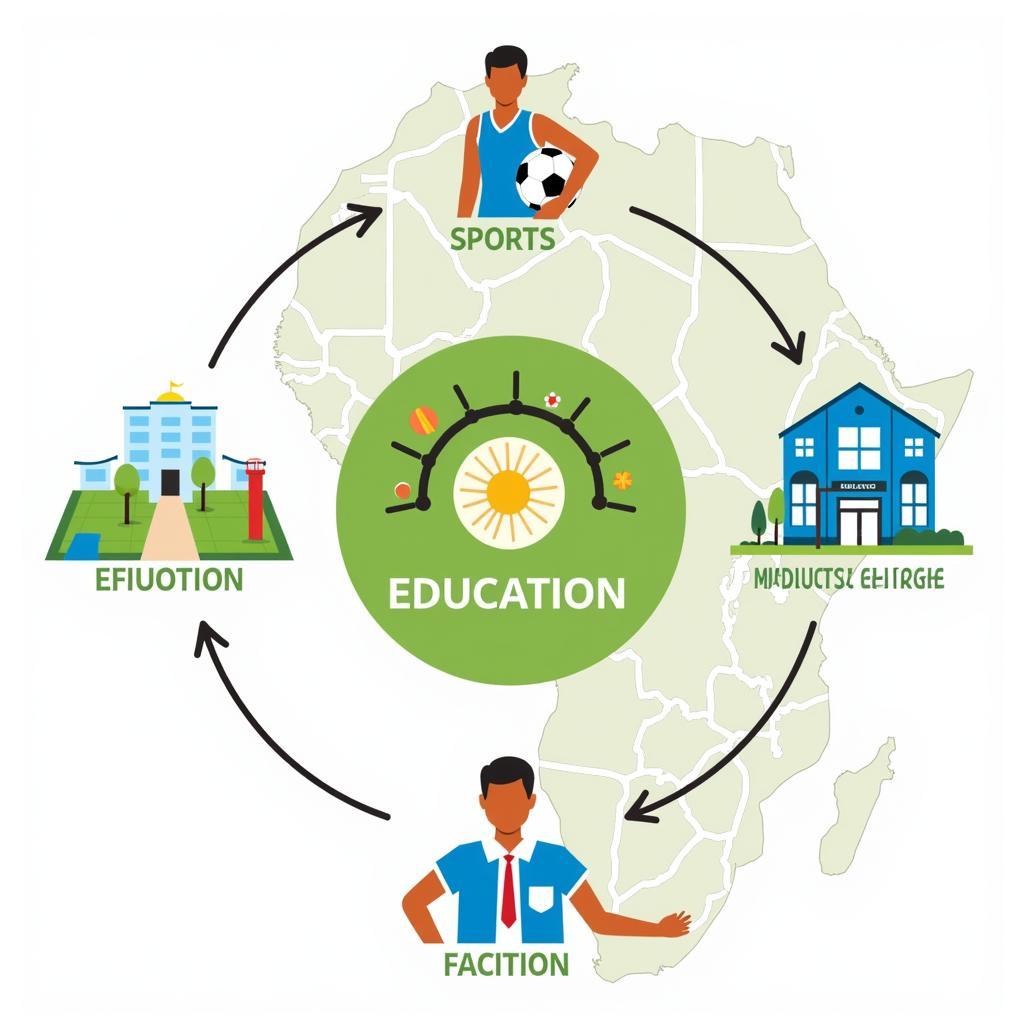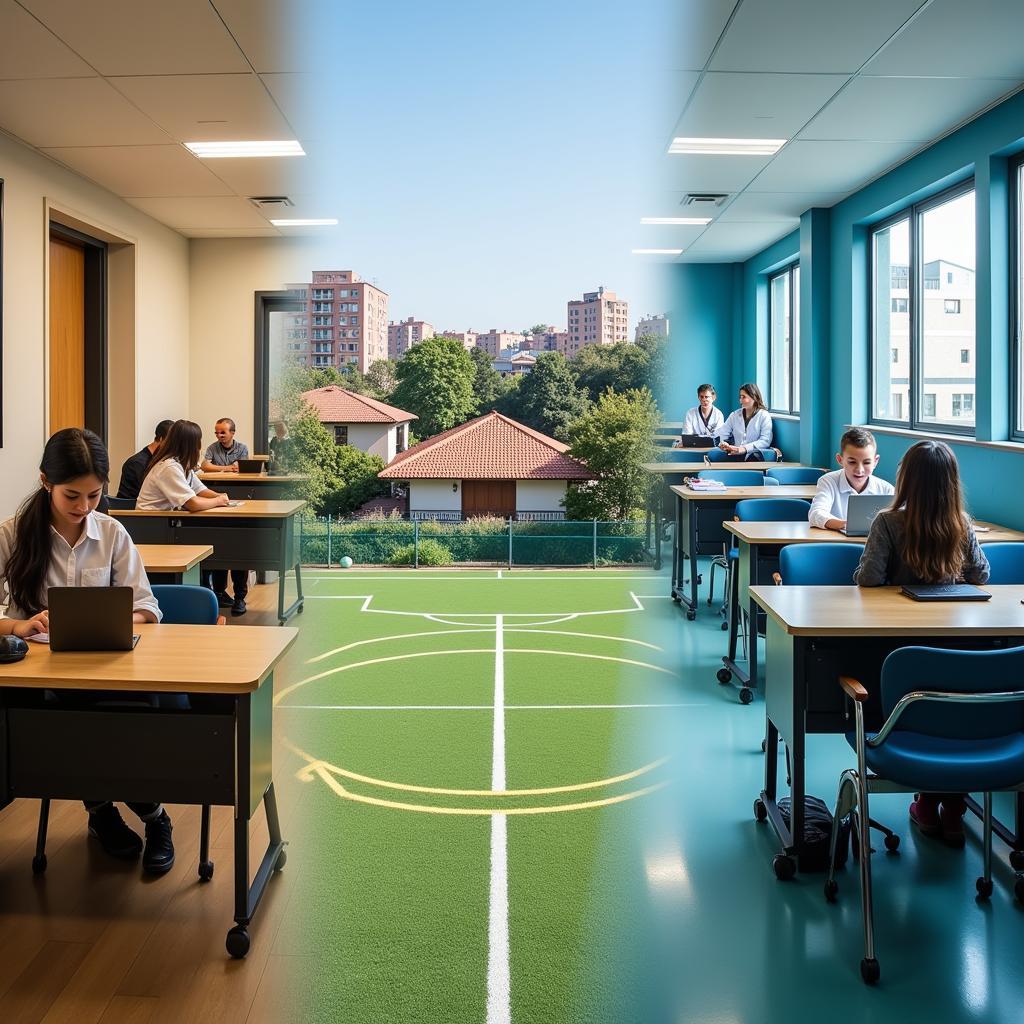The topic of how promoting sports can positively impact developing countries is increasingly relevant in IELTS Writing Task 2 essays. Based on recent exam trends and analysis of past papers, this theme has appeared with moderate frequency and is likely to continue being a popular subject. Let’s examine a real IELTS question on this topic and explore sample essays across different band scores.
Some people think that governments should spend money on promoting sports in developing countries. Others believe that this money could be better used for more important things like education and healthcare. Discuss both views and give your own opinion.
Analyzing the Question
This question requires candidates to:
- Discuss the view that governments should invest in sports promotion in developing nations
- Discuss the opposing view that funds should be allocated to education and healthcare instead
- Provide their personal opinion on the issue
The key challenge is to present balanced arguments for both perspectives before concluding with a well-reasoned personal stance.
Sample Essay 1 (Band 8-9)
There is ongoing debate about whether governments in developing countries should allocate funds to promote sports or focus on essential sectors like education and healthcare. While both arguments have merit, I believe a balanced approach that includes sports promotion can yield significant benefits for developing nations.
Proponents of sports investment argue that it can have wide-ranging positive impacts on society. Firstly, promoting sports can improve public health by encouraging physical activity, potentially reducing the burden on healthcare systems in the long run. Additionally, sports programs can foster social cohesion, teach valuable life skills such as teamwork and discipline, and provide positive outlets for youth energy. Moreover, success in international sports can boost national pride and even generate economic benefits through sports tourism and related industries.
On the other hand, those who prioritize education and healthcare contend that these are fundamental pillars of societal development that should take precedence. They argue that without a strong educational foundation and adequate healthcare, a country cannot truly progress, regardless of its sporting achievements. Investing in schools and hospitals has a direct impact on citizens’ quality of life and future prospects. Furthermore, they point out that sports infrastructure can be expensive to build and maintain, potentially diverting resources from more critical needs.
In my opinion, while education and healthcare should indeed be top priorities, governments should not entirely neglect sports promotion. A strategic approach that integrates sports into education and health initiatives could yield synergistic benefits. For instance, school-based sports programs can enhance students’ overall educational experience, promoting physical and mental well-being alongside academic learning. Similarly, community sports initiatives can complement public health campaigns by promoting active lifestyles.
In conclusion, rather than viewing sports promotion as competing with education and healthcare, developing countries should seek ways to harmonize these elements. By doing so, they can harness the power of sports to support broader development goals while ensuring that fundamental societal needs are met.
 Sports, Education, and Health Integration in Developing Countries
Sports, Education, and Health Integration in Developing Countries
Sample Essay 2 (Band 6-7)
The question of whether governments in developing countries should spend money on promoting sports or focus on education and healthcare is a complex issue. Both sides have good points, and I will discuss them before giving my opinion.
Some people think that governments should invest in sports promotion. They say that sports can help make people healthier, which is good for the country. Sports can also bring people together and make them feel proud of their country. For example, when a country’s team wins in international competitions, it makes everyone happy. Sports can also create jobs and bring in money from tourists who come to watch big events.
However, others believe that education and healthcare are more important. They argue that without good schools and hospitals, a country cannot develop properly. Education helps people get better jobs and improve their lives, while good healthcare keeps people healthy and able to work. These things are seen as basic needs that should come before sports. They also say that building sports facilities can be very expensive, and that money could be used for more important things.
In my opinion, I think both sports and education/healthcare are important, but education and healthcare should come first. A country needs healthy, educated people to grow and develop. However, I also believe that some money should be spent on sports, but in a smart way. For example, schools could have sports programs that help students stay healthy and learn teamwork. This way, sports can be part of education.
To conclude, while education and healthcare should be the main focus, governments in developing countries should not completely ignore sports. They should find ways to include sports that help with education and health, rather than spending a lot of money on big sports projects.
 Balanced Approach to Development: Sports, Education, and Healthcare
Balanced Approach to Development: Sports, Education, and Healthcare
Sample Essay 3 (Band 5-6)
There is a big debate about if governments in poor countries should spend money on sports or on education and health. Some people think sports are good, but others say education and health are more important. I will talk about both ideas and give my opinion.
People who like sports say it is good for countries. They think sports make people healthy and happy. When a country is good at sports, people feel proud. Sports can also bring money to the country when tourists come to watch big games. Some famous sports players can make their country famous too.
But other people think education and health are more important. They say that schools and hospitals are very necessary for everyone. If people are not healthy or educated, they cannot work well or have good lives. These things are basic needs that all people should have. They also say that sports buildings cost a lot of money to build and keep working.
I think that both ideas are right, but education and health are more important. Countries need to make sure all people can go to school and see a doctor when they are sick. But I also think some money for sports is good. Maybe schools can have sports classes to help students be healthy and learn to work together.
In conclusion, I believe governments should spend most money on education and health, but also some on sports. This way, countries can grow and be strong in many ways.
 Prioritizing Education and Healthcare in Developing Nations
Prioritizing Education and Healthcare in Developing Nations
Explanation of Band Scores
Band 8-9 Essay:
- Fully addresses all parts of the task with a well-developed response
- Presents a clear position throughout the response
- Uses a wide range of vocabulary with very natural and sophisticated control
- Uses a wide range of complex structures with full flexibility and accuracy
- Demonstrates excellent paragraph organization and cohesion
Band 6-7 Essay:
- Addresses all parts of the task, though some parts may be more fully covered than others
- Presents a relevant position, although conclusions may become unclear or repetitive
- Uses an adequate range of vocabulary with some flexibility and precision
- Uses a mix of simple and complex sentence forms
- Has generally good paragraph organization, but may lack some cohesive devices
Band 5-6 Essay:
- Addresses the task only partially; the format may be inappropriate in places
- Expresses a position but the development is not always clear
- Uses limited range of vocabulary; attempts to use less common words but with some inaccuracy
- Uses a limited range of structures with some attempts at complex sentences
- Presents information with some organization but there may be a lack of overall progression
Key Vocabulary to Remember
- allocate (verb) /ˈæləkeɪt/ – to give something officially to someone or for a particular purpose
- cohesion (noun) /kəʊˈhiːʒən/ – the act or state of sticking together tightly
- synergistic (adjective) /ˌsɪnəˈdʒɪstɪk/ – working together in a creative way to produce a result that is more than the sum of its parts
- infrastructure (noun) /ˈɪnfrəstrʌktʃə(r)/ – the basic systems and services that a country or organization uses in order to work effectively
- harmonize (verb) /ˈhɑːmənaɪz/ – to make different people, plans, situations, etc. suitable for each other or agree with each other
- divert (verb) /daɪˈvɜːt/ – to change the use of something such as money or resources
- complement (verb) /ˈkɒmplɪment/ – to make something else seem better or more attractive when combining with it
- integrate (verb) /ˈɪntɪɡreɪt/ – to combine two or more things in order to become more effective
In conclusion, the topic of promoting sports in developing countries offers a rich ground for IELTS Writing Task 2 essays. It allows candidates to explore the complex interplay between different aspects of national development. When approaching similar topics, remember to present balanced arguments, use a range of vocabulary and complex structures, and clearly state your own opinion.
For practice, try writing your own essay on this topic or related ones such as “The role of sports in national development” or “Balancing investment in physical education and academic subjects in schools.” Share your essays in the comments section for feedback and discussion with fellow IELTS aspirants.


